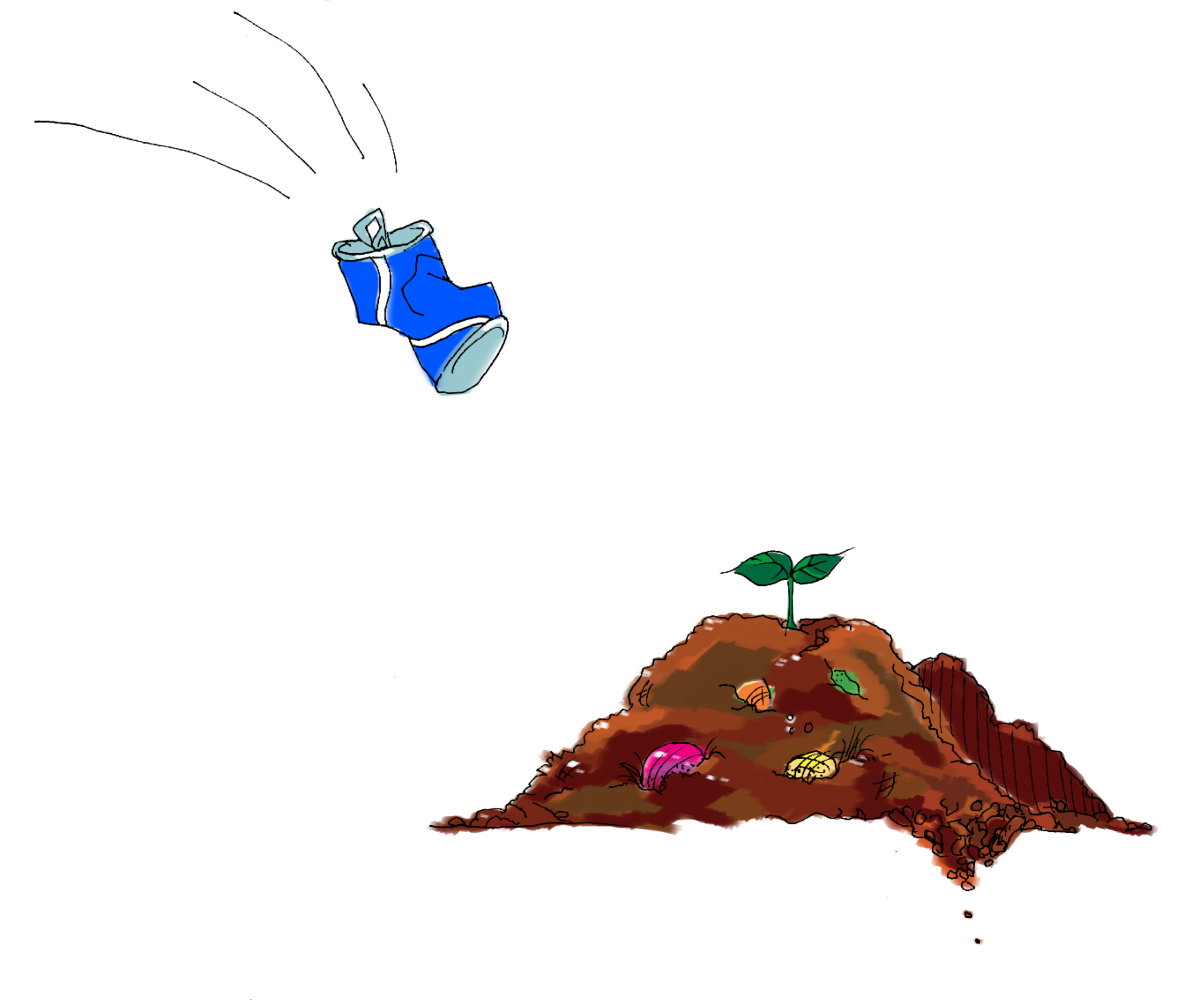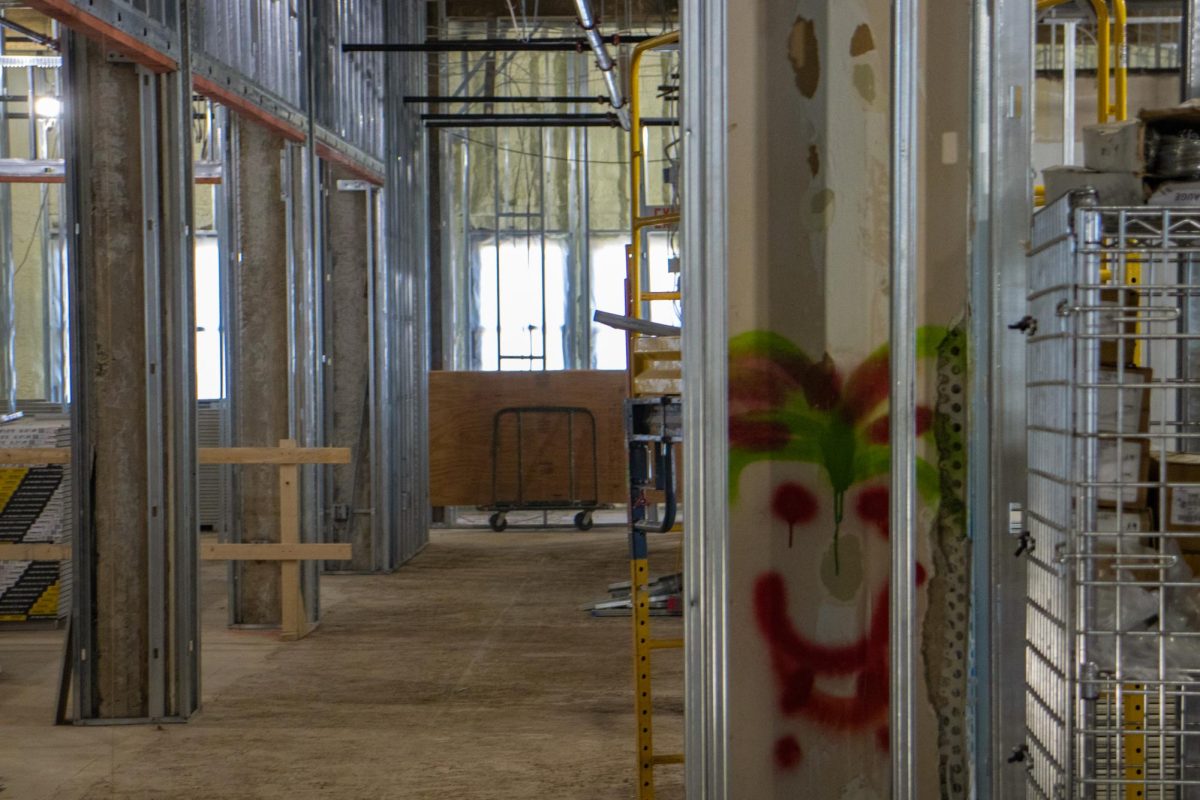Not a Green Eagle: AU's Composting Problem
January 25, 2017
The thin white plate in her right hand is still half full, dotted with three cherry tomatoes, a handful of bright green lettuce and remnants of pasta. Pesto sauce and forgotten noodles line the edges of her dish.
In her left hand she grasps a waxy paper cup of half drunk water and two lemons that bounce into one another as she walks toward the four colorful bins that line the edge of the wall. She drops the cup and food-filled plate into the bin labeled in a thick white font “trash” with the clarification “landfill” underneath.
In 2016, the American University Organic Waste Department reported on the Zero Waste website that “organic waste represents 45 percent of our campus waste.” American University’s composting capacity is limited because composting bins in academic and residential buildings are often contaminated by materials that cannot be safely broken down and composted. This contamination has to do more with student behavior than with the composting industry itself. It’s up to the students themselves to decide where they throw away their food scraps, not the facility to sort misplaced trash.
Organic waste is any type of waste that can decompose with or without oxygen. It is inclusive of food and garden waste, as well as paper and paperboard. Organic waste plays an integral role in creating healthy soil through composting.
In early 2016, AU renewed their composting contract with Prince George’s County yard waste composting facility. However, AU is now only able to compost organic waste that comes from Terrace Dining Room (TDR) and the Mary Graydon Center (MGC).
The Prince George’s County composting facility is currently the only facility available to AU as it is the only commercial organic composting center in the area. However, they cannot accept the contaminated organics that come from AU because they cannot afford to go through the separation process (called sifting) to identify which waste must be thrown away or composted.
“This sifting process is costly, labor intensive, time consuming, unprofitable and [leads to] many safety concerns,” said Mark Feist, assistant director of grounds at AU.
Students either may not know what is compostable or don’t care to carefully sort their trash.
Celeste Davis, a professor of public health at AU and health advocate for Community Catalyst, says the lack of effort is due to people’s inability to connect with the issue of waste. This disconnect translates into carelessness, she says, and it’s the primary reason that AU is unable to compost the majority of their organic waste.
“I think the hindrance with composting is most people don’t understand what it does, what it means,” Davis said. “Most people are confused when they are throwing out their garbage.”
There are various organizations on campus that aim to educate people on how to effectively compost their organic waste. This past summer, students learned how to properly compost during orientation in an effort to accomplish AU’s goal of sending zero trash to landfills.
The Student Zero Waste Club educates students and staff about reducing waste in every factor of life. They teach the public about composting through YouTube videos that explain how to use the composting bins on campus.
“I also think that a big part of why composting hasn’t caught on is that people don’t understand what the true benefits of composting are,” said Darby Hoover, a senior resource specialist at the Natural Resources Defense Council.
When food decomposes in a landfill, it releases methane, a harmful greenhouse gas about 25 times more potent than carbon dioxide in trapping atmospheric heat. Composting organic waste instead of throwing it in a landfill can fortify our soil instead of adding to atmospheric methane.
Forty percent of food in the United States is not eaten, according to a 2012 issue paper published by the Natural Resources Defense Council. This uneaten food is thrown away, wasting much of the world’s finite resources, namely water. The Water Footprint Network and USDA reported that the average american throws away 17 apples which equates to wasting 424 gallons of water.
Hoover says there is a tendency to believe that all waste disappears with no environmental ramifications.
“[We] just put [it] in a big hole in the ground, which is ludicrous when looking at how far we’ve advanced technologically in other ways,” Hoover said. “But psychologically we are still throwing things away.”
People also may be overwhelmed by the sheer number of environmental issues like climate change, ocean acidification and water shortages, and decide that composting is too small for their time or attention.
Recycling is better understood and thus more successful than composting. The market for recycling is much greater than the market for composting, making it an easier program to implement.
“With composting in particular, one of the ways it differs from recycling, is that recycling has an international market,” Davis said. “Food waste and yard waste break down and you can’t ship them around the world to process them, a big part of the problem is that composting hasn’t gotten to the level of recycling.”
This issue has been compounded by the fact that there are limited opportunities to compost at AU. Limited commercial composting facilities mean that organic composting is often overlooked in D.C. communities.
“The PG County Facility is currently operating at maximum capacity. It is difficult or operationally impossible to dedicate space for composting organics on site in urban campus settings such as AU,” Feist said.
With the 2010 Zero Waste Policy, AU made an effort to change perceptions around the significance of composting properly. Feist says that Facilities Management is taking the lead on setting up the infrastructure to reduce waste and working with the Office of Sustainability to raise awareness within AU.
The planet has been destroyed as a result of horrifyingly selfish human habits. In order for the environment to start the process of healing, there needs to be a sustained effort made by individuals to understand why composting is advantageous to environmental health. Each individual has a duty to respect and abide by the composting system so the wellbeing of the planet may be protected.
“I think it’s really important to convey that in fact it is exactly the actions of the individual to make a difference, that cumulatively all those actions add up,” Hoover said.



